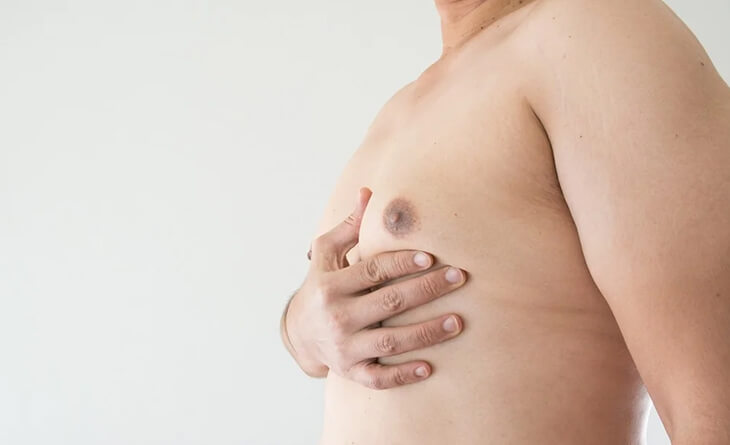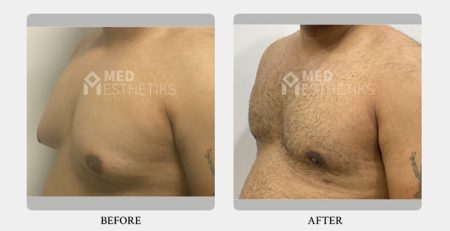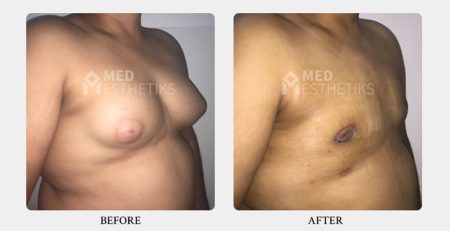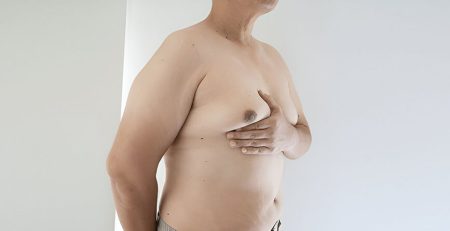What Causes Gynecomastia in Puberty?
Gynecomastia, a condition characterized by the enlargement of breast tissue in males, is notably prevalent during puberty. This development often results from hormonal imbalances accompanying the adolescent years, leading to physical changes that can be both unexpected and concerning. Many people like to undergo gynecomastia procedure to get rid of the extra tissues in the chest area.
Also, experiencing gynecomastia during puberty is quite common. It affects a significant number of adolescents to varying degrees. To treat gynecomastia in puberty, doctors usually perform gynecomastia surgery.
The distinction between Gynecomastia and Pseudogynecomastia
Sometimes, teenage boys usually experience a swollen chest, which might seem like gynecomastia. This happens when the boys grow extra fatty tissue in the chest area, which looks like they have breasts – it is called pseudogynecomastia. To ensure you are not confusing gynecomastia in puberty with pseudo gynecomastia, here is a table showing the distinction between the two:
| Feature | Gynecomastia | Pseudogynecomastia |
| Cause | Excess glandular and stromal breast tissue | Excess fatty tissue |
| Underlying hormonal imbalance | Often present | Usually absent |
| Age of onset | Newborns, puberty, adolescence, older men | Any age, but most common in overweight men |
| Feel of breast tissue | Firm, rubbery mass under nipple | Soft, uniform fat distribution |
| Response to weight loss/exercise | Minimal improvement | Significant improvement with weight loss and targeted chest exercises |
| Treatment options | Gynecomastia procedure may vary. It might include medication, surgery, or observation | Typically managed with weight loss and exercise, liposuction in some cases |
| Psychological impact | Can be significant due to visible breast tissue | May cause self-consciousness, but typically less severe than gynecomastia |
Have questions or want to get started? We are ready to help you with a smile!

How Common Gynecomastia is Among Adolescents?
Gynecomastia is quite common among adolescents, affecting up to 70% of boys during puberty. This widespread prevalence is due to the natural hormonal fluctuations during these formative years. Although the condition can be a source of concern for many young individuals, it’s important to recognize its frequency as part of the normal spectrum of pubertal development, emphasizing that it usually resolves on its own over time. If not, then the patient might need to undergo gynecomastia surgery.
What are the Causes of Gynecomastia in Puberty?
Here are the causes of gynecomastia in puberty:
Hormonal Changes
During puberty, boys experience hormone fluctuations, particularly an increase in estrogen and a relative decrease in testosterone. This imbalance can sometimes lead to the development of breast tissue, a condition known as gynecomastia. While these hormonal changes are a normal part of puberty, they can cause noticeable breast enlargement in some adolescents.
Medications
Several medications can induce gynecomastia as a side effect, including anti-androgens used to treat prostate enlargement or cancer, anabolic steroids, and some AIDS medications. Even drugs like anti-anxiety medications, tricyclic antidepressants, and antibiotics have been associated with this condition. The mechanism often involves altering hormonal balance or promoting estrogen-like effects.
Medical Conditions
Certain health issues can contribute to the development of gynecomastia by affecting hormonal balance. These include conditions like hypogonadism, which impairs testosterone production, and hyperthyroidism, where excessive thyroid hormone production can lead to elevated levels of circulating estrogens. Liver and kidney diseases can alter hormone levels, leading to breast tissue growth.
Lifestyle and Environmental Factors
Lifestyle choices, such as excessive alcohol consumption, use of recreational drugs like marijuana, and exposure to environmental estrogens (found in some plastics and personal care products), can influence the risk of developing gynecomastia. These factors can disrupt the body’s natural hormone levels, promoting breast tissue growth.
Genetics
A genetic predisposition to gynecomastia can also play a significant role. Families with a history of gynecomastia may have a genetic variation affecting their hormonal balance or breast tissue sensitivity to hormones. This means that individuals in the same family may be more likely to develop gynecomastia during puberty or other life stages.
Impact of Gynecomastia During Puberty on Mental Health
The psychological and emotional impact of gynecomastia on adolescents can be immense in some people. This condition often leads to feelings of embarrassment, self-consciousness, and social anxiety, as young individuals may face teasing or bullying from peers. Such experiences can significantly affect their self-esteem, leading to withdrawal from social interactions, depression, or even body dysmorphic disorder. The visibility of gynecomastia can make activities like swimming or changing in locker rooms particularly stressful, exacerbating feelings of isolation.
The importance of support from family, friends, and professionals in navigating these challenges cannot be overstated. A supportive environment where adolescents feel understood and accepted is crucial for their mental health. Professional help, including counseling or therapy, can provide strategies for coping with emotional distress and improving self-esteem. Encouragement to openly discuss their feelings and seek help can empower affected individuals, helping them manage the psychological impact of gynecomastia with resilience and confidence.
What are the Treatment Options for Gynecomastia?
Many cases of gynecomastia resolve naturally over time without treatment, as hormonal levels stabilize with the end of puberty, reducing breast tissue enlargement. However, here are some treatment options for gynecomastia in puberty:
Medical Treatments
In specific cases, medications such as anti-estrogens can be prescribed to help reduce breast size by addressing hormonal imbalances directly.
Surgical Interventions
Gynecomastia surgery is one of the most common treatment options offered by doctors, as it involves liposuction or mastectomy to get rid of the extra fats or breast tissues.
Lifestyle Adjustments
Apart from gynecomastia surgery, diet and exercise can help manage body weight and reduce the appearance of gynecomastia, while avoiding substances that affect hormone levels, like alcohol and certain drugs, can prevent the worsening of the condition.
Coping Mechanisms and Support
Coping mechanisms and support strategies play a crucial role in navigating emotional distress and maintaining mental health. When facing challenging times, it’s important to develop healthy coping strategies such as mindfulness meditation, journaling, or engaging in physical activity, which can provide emotional relief and enhance mental well-being. Additionally, seeking support from others can be beneficial. Patients can also consider joining support groups to share experiences and receive empathy from those who understand what they are going through.
Going through tough times due to gynecomastia in puberty? Our board-certified plastic surgeon at Med Esthetiks can help you using gynecomastia surgery after a detailed conversation and discussion on the condition. They will also tell you if you are an ideal candidate for gynecomastia surgery.

Dr. Lokesh Handa
M.S, M.Ch
Sr Consultant Plastic, Aesthetic and
Hair Transplant Surgeon
Dr. Lokesh Handa, a board-certified plastic surgeon with over 15 years of experience, holds esteemed titles of M.S. and M.Ch. He serves as a Senior Consultant in Plastic, Aesthetic, and Hair Transplant Surgery.
As the Director of Med Esthetiks, his commitment to excellence is evident. Dr. Lokesh Handa is a distinguished member of renowned organizations, including ISAPS (International Society of Aesthetic Plastic Surgeons), APSI (Association of Plastic Surgeons of India), and IAAPS (Indian Association of Aesthetic Plastic Surgeons). With extensive expertise, he blends precision and artistry, offering unparalleled care in the realm of plastic surgery and contributing significantly to the advancement of aesthetic practices.
To book an appointment, call: +91-8800203431 or email: care@medesthetiks.com











